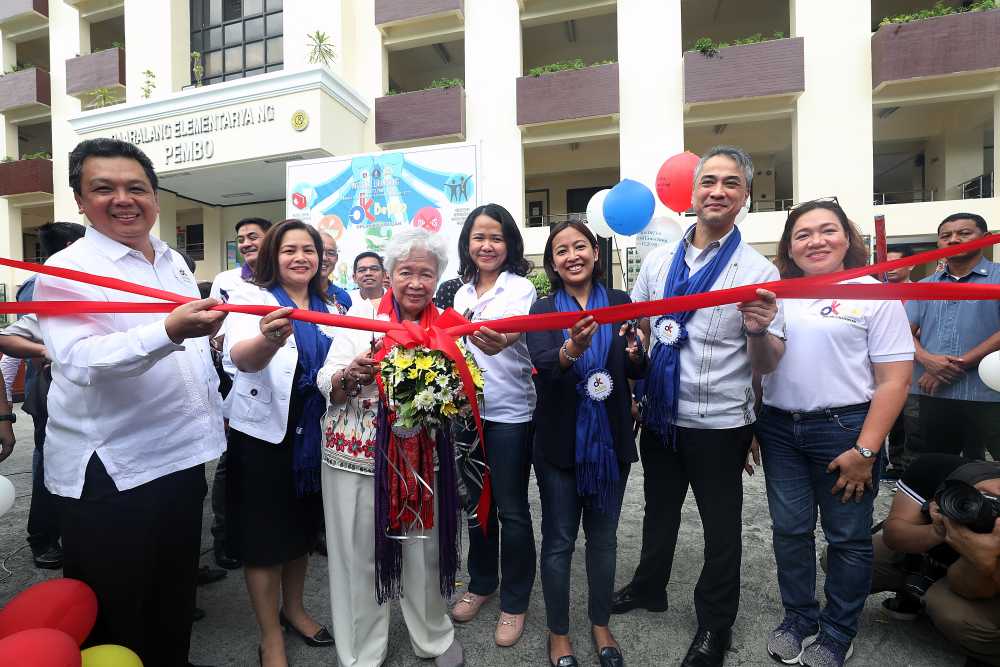The Department of Education (DepEd) and the Department of Health (DOH) launched “Oplan Kalusugan” (OK SA DEPED) and “Healthy Learning Institutions” (HLIs) in a bid to address malnutrition in schools.
In a compelling speech, DepEd Undersecretary and Chief-of-staff Epimaco Densing III the reason for the launch of OK SA DEPED. He emphasised the intrinsic connection between health and the delivery of quality education. THis is a crucial link essential for the nation’s economic recovery following the coronavirus-disease 2019 (COVID-19) pandemic.
Expressing optimism as the nation gradually exits the pandemic, Densing stressed the imperative need for thorough preparation and support mechanisms. He also accentuated that the program is crucial for ensuring the well-being of children and learners across all educational institutions, whether in the public or private sector.
In the context of addressing malnutrition, Education spokesperson Michael Poa shed light on a concerning statistic. He revealed that 1.7 million learners have been identified as falling into the wasted and severely wasted categories this year. These learners are actively enrolled in the ongoing school-based nutrition program, benefiting an expansive 3.5 million learners nationwide. Notably, this comprehensive figure encompasses the well-being of 1.8 million Kindergarten beneficiaries.
The National Kick-off of the OK SA DEPED and HLI launching aligns with Joint Order 11223, also known as the Universal Health Care Act.
Oplan Kalusugan
Specifically, OK SA DEPED strives for the comprehensive execution of school-based nutrition programs and services. It aims to supply all public school teachers with health and nutritional services. It also guarantees the well-being of DepEd personnel through basic medical care. Additioanlly, it will compile health and nutrition records of learners for effective planning, and optimise opportunities for expanded health and nutrition services delivery.
OK SA DEPED encompasses initiatives related to drug education, comprehensive tobacco control, adolescent reproductive health, water, sanitation, and hygiene, as well as medical, dental, nursing services, and mental health. Densing highlighted the necessity for DepEd to confront challenges in these areas. He recognised that education and health constitute two of the three “pillars of economic growth.”
Furthermore, Health Undersecretary Beverly Lorraine Ho emphasised that an integral aspect of the OK SA DEPED and HLI programs involves providing support to schools through the provision of grants.
Healthy Learning Institutions – Health Literacy
Ho emphasised the importance of promoting seven health habits among learners and various age groups to achieve “health literacy.” The seven healthy habits encompass the promotion of a nutritious diet, environmental care, vaccination, prevention of substance abuse (including drugs, alcohol, and tobacco), prioritising mental health, caring for reproductive health, and preventing violence and injuries.
She added that implementing the program is crucial to be present in locations where people spend most of their time. For most people, this is in schools, workplaces, and communities. Hence, the collaboration of DOH with DepEd aligns with the OK SA DEPED initiative, incorporating these into the curriculum. The latest addition is to provide increased funds and support for teachers and staff to facilitate effective interventions.
Target Participants
Initially, the DOH received support from 273 schools in nine provinces and aims to increase the number of participating schools. “The initiative is already in progress to reach the target of 1,500 schools for the upcoming year. Our regional offices actively engage with local government units (LGUs) and schools. Currently, we are in the process of receiving letters of intent, and by the end of November, our goal is to conclude the list of provinces and the schools they include,” Ho mentioned in a press briefing.
Importance of Educating the Students
Dr. Maria Theresa G. Cacas, a Pediatric Consultant and Faculty at UERM Medical Center and College of Medicine, shared the importance of health literacy being taught to children. She said, “Children have bright minds, pure hearts, and they have great capacities to be guided and moulded most especially, they have the ability to follow authorities – parents, guardians, and teachers.
“Health literacy will equip both children and teachers to deal with the preventive and promotive aspects of health care. Also important to mention is the possibility that they also learn the early recognition and intervention that they can perform. This may sound heavy, but let me give you an example. Aside from the seven health habits, they can be taught simple health tasks like- recognising respiratory problems just by merely teaching them the normal breathing rate and teaching them to count the respiratory rate… or fever, by teaching them the normal body temperature and the proper use of thermometers.”
Doctor’s Word of Advice
“As a paediatrician, we should educate our kids.
In the clinic, they do not only listen to our advice but they tend to comply. Authorities’ words are “rules” for them. Let us teach them early about proper nutrition- emphasise that malnutrition and illnesses relate in a vicious cycle,” encouraged by Dr. Cacas.
Conclusion
The joint efforts of Oplan Kalusugan and HLIs exemplify a proactive approach towards ensuring that the educational journey of each learner is not just academically enriching but also safeguards their health—a holistic strategy aimed at fostering a resilient and thriving future generation in the wake of unprecedented challenges.

